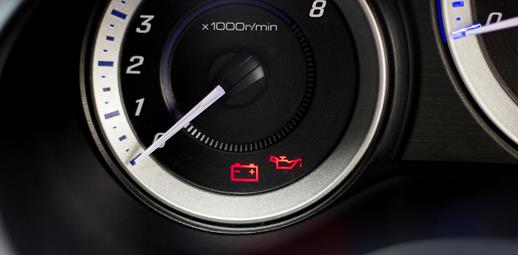
Doing basic car maintenance on a regular basis is essential, and there’s plenty you can do to maintain your vehicle in between its trips to the garage. Following our car maintenance checklist might even help you reduce those service bills and keep your car roadworthy.
So why not roll up your sleeves and have a go at our simple but essential vehicle maintenance tips? And remember, your car’s manual is your friend – it will walk you through how to maintain your specific model and tell you when certain things need doing.
EASY AS HACK
Trying the 20p test is a quick and simple way of checking if your tyre tread is above the legal limit.
1. Top up your windscreen wash
Did you know that it’s a legal requirement to have fluid in a vehicle's screen washer bottle? It’s always a good idea to keep it in check. Make sure it’s topped up, especially in the winter and before long journeys.
2. Test tyre tread depth
Regularly check the pressure of your tyres and inflate them if necessary. Overly low or high tyre pressure can change how your car drives and lead to uneven wear and tear, sometimes shortening their lifespan.
Tyres must be the right type and size for your model, with a minimum legal tread depth of 1.6mm across the central three-quarters of the tyre – the 20p test is a quick and simple way of checking if your tread meets the legal limit.
3. Top up your engine oil
Ensure your oil level is between the minimum and maximum mark on your car's dipstick. If you’re low on oil, you risk breaking down or causing damage to your car’s engine. Too much oil can cause damage, too, so don’t just pour a whole bottle in.
How often should you check and change your oil?
You should check your oil at least every few weeks. If you make lots of long journeys you should check your levels more often.
When it comes to topping up, many experts agree that you should add oil every six months, or based on how many miles you drive:
- Every 1,000 miles – if your driving consists of trips that are mostly 10 miles or less, you should consider changing your oil every 1000 miles. Short journeys mean your engine doesn’t get hot enough to boil off condensation in the system, which can degrade the oil faster.
- Every 3,000 miles – the recommended interval by most car experts. This is perhaps a little outdated due to the advance of technology, but if you have an older model car, it might be best to stick to this recommendation.
- Every 5,000 to 7,500 miles – this is the recommended interval in most car manuals. Manufacturers recommend that you still take your driving style into account when deciding how often to change your oil.
- Every 10,000 to 15,000 miles – this interval is mainly used if you have made the switch to synthetic oil. It’s more expensive but does perform better and is kinder to the environment.
Top tip: Always turn your engine off and wait for it to cool down before checking your oil level.
4. Keep your battery in check
Aim to change your car’s battery every three years, if possible, as a flat or faulty battery is a common cause of vehicle breakdowns.
According to Green Flag, warning signs of battery failure include the engine turning over more slowly than usual when you start it.
Also, the red battery light in the instrument display may flicker when you’re driving or take longer than usual to go out after you’ve started the engine.
5. Check if your car is due a service
A car service is typically recommended every 12,000 miles or every 12 months, whichever comes sooner. Every car is different, so check your car’s manual and your mileage to avoid leaving it until it’s too late.
6. Top up your cooling system liquid
Despite its name, coolant – a mixture of antifreeze and water – isn’t just for winter. Your car needs it all year round to keep the engine at the right temperature. Check your car manual to make sure you stay on top of your car’s coolant needs.
7. Check your horn
It’s important that your car’s horn is functioning and clearly audible, in case you need to warn other drivers or pedestrians of any potential dangers.
8. Check your exhaust for leaks and holes
Start the engine in a well-ventilated space to check for leaks in your exhaust pipe and listen for any unusual noises or smoke.
9. Keep an eye on your mirrors
Before every journey, ensure your mirrors are clearly visible from the driver’s view. Make sure they don’t have any damage and are completely clean.
10. Clean your reversing camera
If your car has a reversing camera, you may also want to give the lens a quick clean.
11. Test your brakes
Test the handbrake and footbrake to ensure they work properly. It’s a good idea to do this on your driveway or somewhere without traffic, so you can give your brakes a go safely.
12. Try out your lights and indicators
It’s easy to lose sight of how well your car lights are working.
That’s why it’s a good shout to have someone stand outside the car while you test your lights and indicators to confirm if they all work properly, including your fog lights.
13. Put your windscreen wipers to the test
Check your windscreen wipers are in good condition, with no tears or holes.
While you’re at it, scan your windscreen for chips and, if you find any, get them repaired as soon as possible. Chips can sometimes turn into cracks which can require a replacement rather than repair.
14. Pay attention to dashboard messages
Lots of people don’t know what their dashboard warning lights mean. Take time to get to know what they’re about and how you should react to each of them, so you’re not caught by surprise if one comes on while you’re driving.
15. Watch out for rust
Watch for the first signs of rust forming and deal promptly with any damage to bodywork to prevent it from setting in. You may think rust is merely a cosmetic problem, but it can actually cause significant damage if it reaches your car's frame.
Signs that your car needs maintenance
There are several signs that your car might need maintenance.
- The engine light will come on
- Issues with braking
- Lacking acceleration
- Unexpected vibrations
- Stalling
- Difficulty starting the car
- Difficulty shifting gears
How often should you get a full service on your car?
You should get your car serviced every 12 months or 12,000 miles. If you notice any serious issues before your yearly service, take your car to a garage sooner.
How often should I check my car?
Different parts of your car need checking at different times.
Every month:
- Tyre pressures
- Lights and indicators
- Oil and coolant levels
- Windscreen condition
- Windscreen washer levels
- Horn
Every 3 months:
- Top up engine oil and change oil filter
- Check car battery and cables
- Check your exhaust
Every year:
- Test brakes
- Rotate tyres
Go to our Your car hub to get more guidance on some of the issues that matter to drivers.
You can find out more about our car insurance here.

